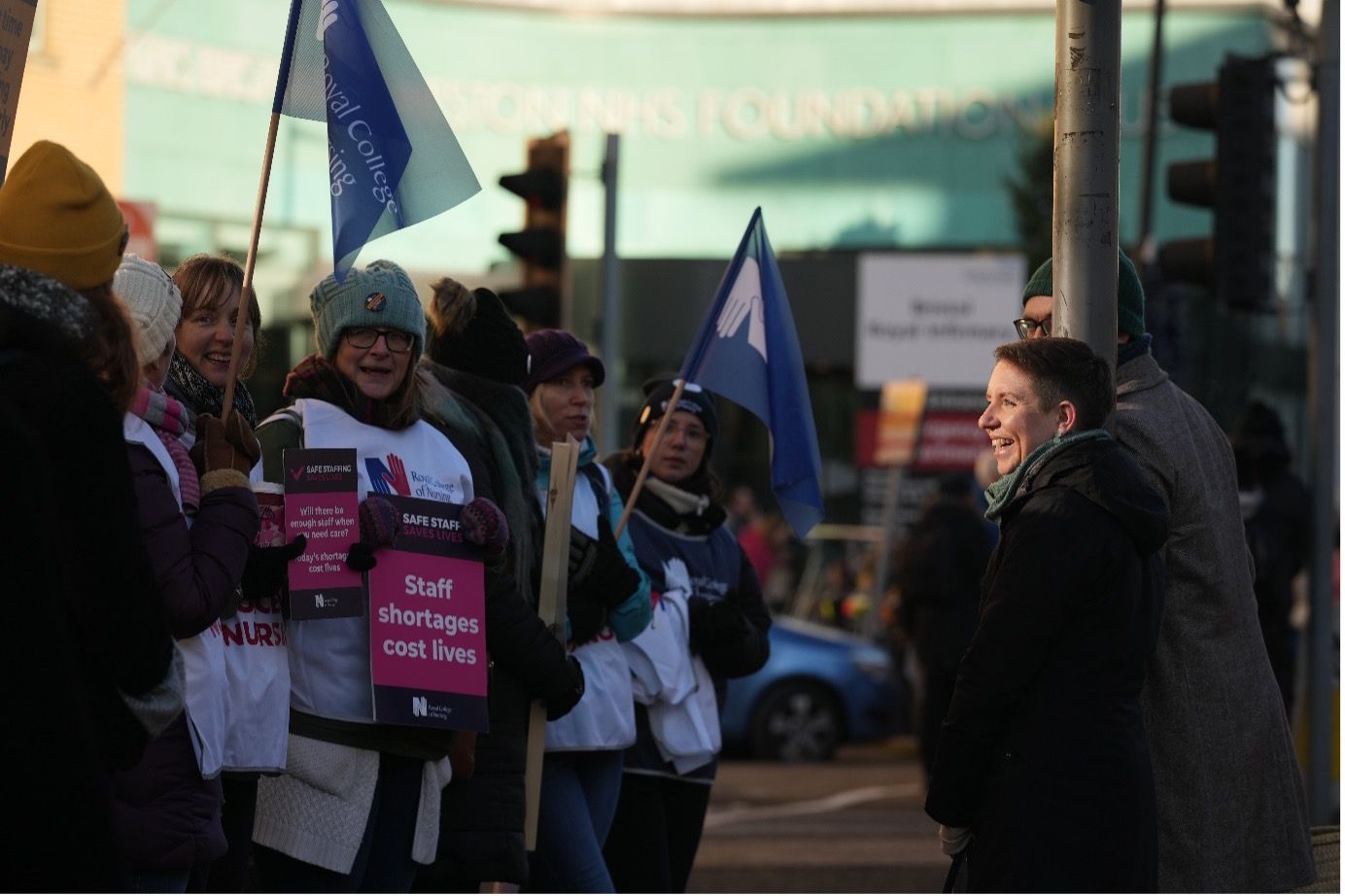By Marine Saint, Deputy Editor and Features Columnist
Bristol has been inundated with signs of industrial action encompassing university staff, postal service workers, public transport, and local healthcare workers. The Bristol Royal Infirmary is a visible presence for students, both in the University’s medicine courses and due to its proximity to campus and student accommodation, but what is the significance of the ongoing NHS nurses’ and ambulance staff strikes?
In December 2022, nurses across the UK took part in strikes for better pay and working conditions, in an attempt to preserve their profession and protest staff shortages. A momentous show of solidarity, this was the first time in history where nurses partook in industrial action. The largest collective NHS strike action began at the start of February, again breaking records as the biggest walkout for the NHS to date.
🚨TODAY🚨 Our ambulance members walk out in the biggest NHS strike in our history.
— Unite the union: join a union (@unitetheunion) February 6, 2023
💙 They deserve our full support💙
✊🏼 Share now to show your #solidarity for NHS workers ✊🏼#nhs #biggeststrikeinnhshistory #nhsstrike #ambulance #ambulancestrike #hospital #SaveOurNHS pic.twitter.com/ca5gUhHh4Y
After last month’s prolific strikes incorporated 55 NHS trusts, nine of which were Southwest based, appointments and surgeries across the country were affected. This has exacerbated into increased tensions between the key unions, The British Medical Association, The Royal College of Nursing, Unite, as well as GMB and the government, especially with regards to emergency calls. In order to match current pay rise offers made in Wales and Scotland for nurses, current strikes will only be called off if a further pay rise is offered of five per cent above inflation, an increase from what was initially proposed to healthcare unions.
As emphasized by Dr Giorgos Gouzoulis, a Lecturer in Human Resource Management and Future of Work at the University of Bristol Business School, this is an ongoing and critical issue: ‘Frontline healthcare workers have put their lives at risk over the last three years, especially during the pandemic, despite the worsening working conditions they face. Adjusting their salaries to inflation and hiring more staff is essential, not only as a means of restoring justice for these people, but also key for every citizen to receive decent healthcare services.’
Speaking to Epigram, Dr Gouzoulis outlined the historic issues of wages and patient wait times fueling the strikes:‘Currently, the inflation-adjusted wage of the average nurse in the UK is almost six per cent lower compared to 2010/11, while one in nine nurses have quit since 2021. At the same time, after decades of de-funding the NHS, data shows that since 2010 referrals-to-treatment waiting lists have been growing dramatically, reaching over six million patients in 2021.’
"Do you really care about the NHS? Will you keep the NHS as it was always intended to be? Prove it to us."
— The RCN (@theRCN) February 6, 2023
This is what nursing staff would say to PM @RishiSunak if they had one minute with him.
It's exactly what has led to the #RCNStrike.
RT in solidarity with nursing. pic.twitter.com/WfAzy97Yqi
It is therefore crucial for students to be informed about the industrial action occurring in our city and the national implications, as we benefit from both student healthcare services and Bristol’s healthcare services, which suffer from deep-rooted, systematic issues within the structure of the NHS. This has resulted in a daily crisis of hospital delays and rising ambulance wait times, although emergency procedures have continued to operate.
The RCN has asked for what the government declared to be an ‘unaffordable’ 19 per cent pay rise but will reportedly accept a rise of ten per cent. This characterises the motivation of these strikes, with the resounding message of ‘Fair Pay for Nursing’ pervading social media as part of the healthcare unions’ campaign tagline to rally the protests.
Green Party Co-Leader and Bristol West MP candidate Carla Denyer has been consistently vocal in her support for the strikes, directly blaming government inaction: ‘The Tories are allowing the NHS to disintegrate before our eyes. After twelve years of Conservative underinvestment, real cuts to funding and the loss of thousands of beds, our hospitals are in meltdown.’

Denyer attended last month’s nurses’ strikes in Bristol and relayed the impact this had: ‘Visiting the nurses’ picket line recently, I heard so many stories of nurses working in dangerously understaffed hospitals. Nurses are rightly standing up for fair pay for themselves, but also, crucially, for a safe NHS. The government must agree to negotiate with them.’
There are indications of some productive conversations occurring as a result of strike action, with emergency care now recognised as a priority by the government. £200 million has been invested in social care following the Downing Street’s NHS Recovery Forum in early January. This was seen by representatives of the RCN as a positive start but has not resolved the ongoing battle between healthcare workers and the government, hence the continued strike action scheduled for the coming months.
‘They’re not listening to us’ | Students and teachers express concerns about the Minimum Service Levels Bill
'Students risk becoming the forgotten group' in the UK recession
For the RCN, real change requires more long term, sustained investment as a solution to the bedding crisis in hospitals, beyond increasing care home capacity and tackling ambulance delays — problems which are all too familiar to Bristol’s healthcare services.
Featured Image: Upfest
Have you been impacted by the ongoing NHS industrial action?









